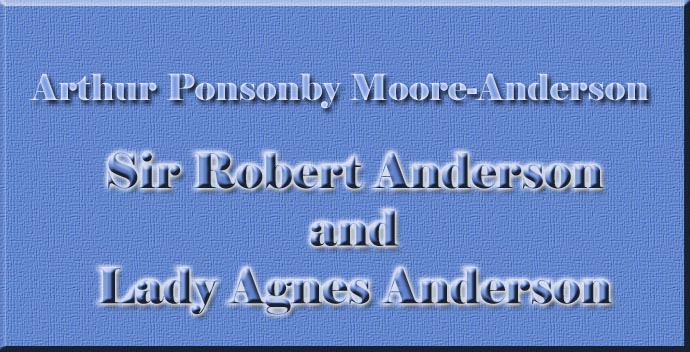
Sir Robert Anderson and Lady Agnes Anderson
By Arthur Ponsonby Moore-Anderson
Epilogue
|
" If we could only realise that Christ is all, what a power there would be in our Christianity ! Remember that if we get near to Christ we shall get near to each other. If a number of people are met in a large room, where the windows look out upon beautiful scenery and everything is an attraction, you will find some will go to the windows, others will gather round the book-cases, others round the fireplace, and so on ; but if they are invited there to meet some person of commanding presence and attraction, everything else is forgotten. If Christ had the place in our creed and heart that He ought to have, there would be personal loyalty and personal love, and this is just what He claims." " Nowhere does the Bible enjoin upon the Christian to become a pilgrim ; and, using the word in its spiritual sense, the visit of a Romanist to Rome, for example, is the very antithesis of a ` pilgrimage.' `What ! ' (our readers will exclaim with indignant surprise) ` Does not the Scripture tell us we ought to become pilgrims ? ' The answer is a great big NO. The aim which human religion always sets before its votaries is to gain Divine favour by efforts to become something that they are not ; the true effort of the Christian life is to realise and live up to what, by God's grace, we are. The Christian is a pilgrim ; let him see to it that he lives as a pilgrim." " Here, then, is the answer to the question, ` What is it about ? ' The Bible is about Christ. The public facts of His life and death are matters of evidence, and undisputed ; but the hidden facts on which faith depends are entirely matters of revelation. For example, no one doubts that ' Christ died for our sins, according to the Scriptures,' and the only Scriptures then in existence were those we call the Old Testament. To disparage them, therefore, is to undermine faith, for if they be not what Christ said they were, it is certain that He was not what He declared Himself to be ; and, as we have seen, the Kenosis theories of the critics are here of no avail. The real question at issue, therefore, is not the authority of the Bible, but the Deity of Christ, and in defending the Bible " we are contending for our all.' " You know the First Epistle to the Corinthians, with all its wealth of truth and exhortation, and rebuke and warning. And now the Apostle takes up the pen to sign it : ` The salutation of me, Paul, with mine own hand. If any man love not the Lord Jesus Christ let him be anathema ' ; let him be accursed. It is an awful word. I do not think we should use these words first against those, who seem to us to come under them, but use them rather by turning them like a searchlight upon our own hearts and lives." " My eye fell upon an advertisement in The Times to-day. It is headed, ' A religion of common sense,' There is no religion of common sense, but there are plenty of religions of uncommon nonsense. There is a religion of Divine revelation, and this is what we want." " The movements I have indicated-and especially the New Theology, Spiritualism and Christian Science-are but divisions of the great army which is even now being marshalled and trained for the terrible struggle of the latter days. What is the distinctive peril of these awfully solemn times ? Atheism has been killed by the growth of an enlightened rationalism, as has also the blind and stupid infidelity of Hume. And drunkenness, dishonesty and vice are denounced as earnestly by men of the world as by the Christian. Our distinctive peril is in none of these, but in a subtle kind of spurious Christianity-a cult that teaches the Fatherhood of God and the brotherhood of men, and inculcates a high philanthropy and a pure and charming code of ethics, and that adopts every Christian truth, excepting only what is vital-everything except the Deity of the Lord Jesus Christ and redemption by the blood of His cross." " Spiritualism, the New Theology, Christian Science, etc.-all these systems acknowledge God, but all agree in ignoring sin and Satan, death and judgment to come. And their ultimate aim is to disparage and dethrone the Lord Jesus Christ. For, as Luther phrased it, Satan ` hath no other business in hand.' Every ` spirit ' cult is anti-Christian."-In Evangelical Christendom. " Why should we not investigate for ourselves these intensely interesting phenomena ? The answer is two-fold " 1st. Because of the Divine prohibition ; and " 2nd. Because of warnings derived from the experience of others. " For those who. yield themselves to spirit influence cannot shake free from that influence at will, and many a Christian life has been wrecked by frequenting spiritualistic seances."- Article on Spiritualism in The Association News. |
|
 |
 |
|
|
|
-
Site Navigation
 Home
Home What's New
What's New Bible
Bible Photos
Photos Hiking
Hiking E-Books
E-Books Genealogy
Genealogy Profile
Free Plug-ins You May Need
Profile
Free Plug-ins You May Need
 Get
Java
Get
Java.png) Get Flash
Get Flash Get
7-Zip
Get
7-Zip Get Acrobat Reader
Get Acrobat Reader Get
TheWORD
Get
TheWORD